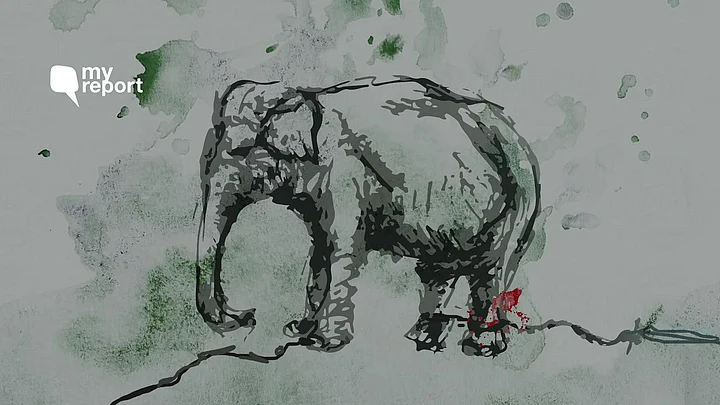In January 2020, a wildlife elephant was captured by Kapilash Zoo in in Dhenkanal district in Odisha because of man-animal conflict. The jumbo, Rakesh, is said to have killed over six persons. So its four legs were tied to the ground. He constantly tried to free himself from the chains, which resulted in deep wounds on his legs. They then began treating the wounds but the elephant just became more aggressive.
Now they have confined him in a kraal (an enclosure), with no space to even move. They feed him very less food and water, so that he is always hungry. This way they can make him surrender to the commands of the humans. This is like breaking his spirit, to make him a man’s slave.
Rakesh has suffered a lot in zoo captivity for no mistake of his own and he is yet to get justice.
I, a wildlife enthusiast, have written to the Central Zoo Authority and even sought intervention by Animal Welfare Board of India (AWBI). I have reached out to the Forest department of Odisha and Project Elephant requesting that he be moved to a sanctuary, but I haven’t received any response till date.
And instead of releasing him back to the wild or a sanctuary, discussions are going on to tame him, in a cruel way, to turn him into a kumki elephant to catch other wild elephants. (Kumki elephants are used to train captive Asian wild elephants, sometimes to rescue or to provide medical treatment to an injured or trapped wild elephant.)
It was also shocking to know that Kapilash Zoo is only recognised as a small zoo and the license was valid only till 23 August 2018. Being not recognised as an Elephant Rescue center from Project Elephant and Central Zoo Authority, how can they catch wild elephants and torture like this?
According to Wildlife Protection Act 1972 Rule 38-I. Acquisition of animals by a zoo.—
(1) Subject to the other provisions of this Act, no zoo shall acquire, sell or transfer any wild animal or captive animal specified in Schedules I and II except with the previous permission of the Authority.
(2) No zoo shall acquire, sell or transfer any wild or captive animal except from or to a recognised zoo.
(Graphic Warning: Visuals may be disturbing for viewers.)
The RTI reply I received from Project Elephant of MoEF said that they do not have any information regarding the permission of capturing the wild tusker Rakesh, which shows that the Odisha Forest department has disobeyed the above WPA Rules.
When the government does not have enough funds and facilities to rehabilitate existing sick and old captive elephants across the country, capturing new elephants from the wild and maintaining them in captivity is not a good idea.
The man-animal conflict has to be addressed in the wild itself.
While the central government is trying to mitigate man-animal conflict and protect wild elephants through new practices and policy changes, the Odisha government seems to be resorting to such cruel practices.
Kindly help Rakesh live a chain-free life that he deserves.
I have also started a petition on Change.org that has received over 81,172 signatures as on 2 September.
The Quint reached out to the District Forest Officer in Dhenkanal who confirmed that
the permission for Kapilash zoo and sanctuary has been renewed till 2021. He added that the license for Kapilash Elephant Rescue Centre is also recognised by the Central Zoo Authority.
Responding to the elephants injuries because of the chains, he explained, “This was a problematic elephant that had to be tranquilised and brought here. During the initial stage, it was restrained. After that, it has been kept in an enclosure and is under treatment. After the veterinarian gives clearance, it will be decided by the state government and the Principal Chief Conservator of Wildlife whether he will be released in the wild or will be kept in a sanctuary.”
As told to Smitha TK (@smitha_tk)
(At The Quint, we question everything. Play an active role in shaping our journalism by becoming a member today.)
